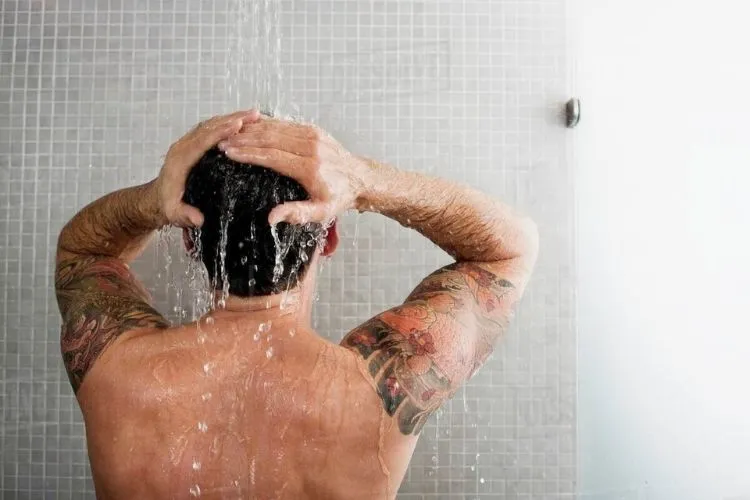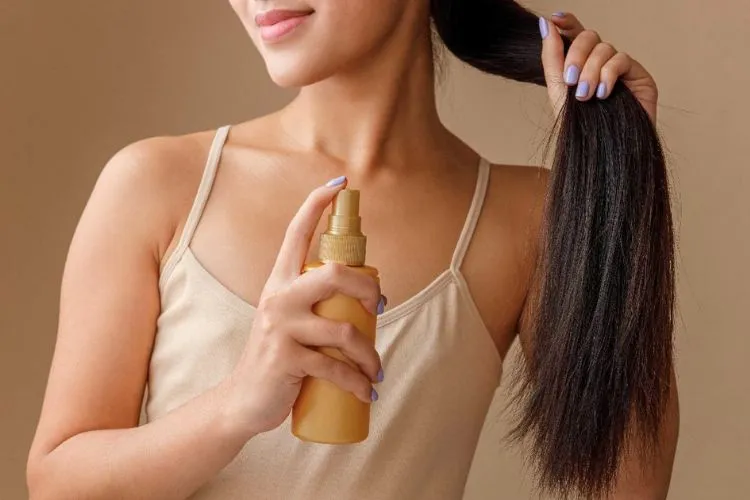Hard water is a common issue in many households. It can lead to various hair problems from dullness and dryness to tangling and thinning.
Knowing how to protect hair from hard water and its effects is key to maintaining healthy, vibrant locks.

💦 How To Protect Hair From Hard Water?
Hard water contains high levels of minerals like calcium and magnesium. When these minerals deposit on the hair, they can strip moisture, reduce natural shine, and lead to breakage.
The signs of hard water damage can include a feeling of residue on the hair, lack of moisture, difficulty with styling, and a decrease in the overall health of the hair shaft.
Assessing Your Water
You can test your water’s hardness with simple home kits or by seeking professional water testing services. These tests are essential in determining the specific contaminants in your water and their concentration levels.
Practical Haircare Tips
Daily practices make a significant impact on hair health. Rinsing hair with filtered or bottled water can help minimize hard water exposure. Shampoos that chelate or clarify help combat mineral buildup and should be used based on individual hair needs, perhaps once a week.
Conditioners and leave-in treatments replenish moisture and protect hair from further damage. These should penetrate hair cuticles to maximize benefits.
DIY Solutions & Home Remedies
Frequent use of apple cider vinegar rinses can balance the hair’s pH and remove hard water buildup.
Homemade hair masks using natural ingredients like avocado and banana can restore moisture and shine. A citrus rinse with lemon or lime juice might also be helpful in removing mineral buildup from the hair.
Haircare Products & Tools
With hard water, selecting the right shampoo is critical. Look for those with ingredients that chelate or are designed for mineral removal.
Shower filters are excellent tools for reducing the amount of hard water coming through your showerhead. Pre-shampoo treatments can also protect hair by creating a barrier between the hair shaft and hard water.
Long Term Hair Health Maintenance
Combating the effects of hard water is an ongoing process. Frequent trims can help by removing split ends caused by hard water damage. Additionally, maintaining a balanced diet and avoiding high-heat styling tools can preserve your hair’s health.
Professional Solutions
Salons offer treatments specifically designed to counteract the effects of hard water—these range from deep conditioning treatments to special detangling processes.
These treatments can be especially beneficial for those suffering from significant hard water damage.
💦 Advanced Hair Care Techniques

Rotating Hair Care Products
- Importance of Variety: Regularly changing shampoos and conditioners can prevent specific mineral buildup, which often occurs with prolonged use of the same products in hard water conditions.
- Scheduled Rotation: Implement a rotation schedule for your hair care products, switching them every few weeks to balance hair cleansing and nutrition.
- Selective Product Use: Integrate specialized products, such as chelating or clarifying shampoos, into your rotation strategically to remove hard water minerals without overuse, which can lead to dryness.
Effective Hair Washing Techniques
- Lukewarm Water: Wash with lukewarm water—hot water can exacerbate hard water’s drying effects on hair.
- Pre-rinse: Before shampooing, thoroughly rinse your hair to remove loose minerals and dampen hair, enhancing shampoo effectiveness.
- Gentle Shampooing: Apply shampoo gently with a focus on the scalp where build-up is common; avoid harsh scrubbing that can damage hair cuticles.
- Deep Conditioning: Follow with a deep conditioner to restore moisture and help combat the effects of mineral deposits.
- Final Rinse: Consider a final rinse with filtered or bottled water to leave hair free of hard water residue.
💦 Frequently Asked Questions (FAQs)
How can I prevent hair loss due to hard water?
Preventing hair loss due to hard water involves reducing the exposure of your hair to the harsh minerals found in hard water. Use a shower filter to minimize calcium and magnesium levels in the water. Incorporate a chelating or clarifying shampoo into your routine, but limit its use to once or twice a week to avoid drying out your hair. Regularly applying deep conditioning treatments can also help maintain hair health and prevent hair loss.
Are there any signs that indicate hard water damage to hair?
Yes, there are several signs of hard water damage to hair. You might notice that your hair feels more dry or brittle than usual. Hard water can cause hair to tangle easily and make it harder to manage. There may also be an increase in frizz and a decrease in natural shine. Residue that feels like a film on the hair after washing is another common sign of hard water damage.
Can hard water cause permanent hair damage?
Hard water itself does not typically cause permanent hair damage. However, prolonged exposure without proper care can lead to chronic issues such as increased breakage, thinning, and difficulty in managing hair texture. Using the right hair care strategies, like water softeners, special shampoos, and regular conditioning treatments, can help reverse most effects of hard water exposure.
How often should I use a chelating shampoo?
Use a chelating shampoo about once a week if you regularly wash your hair in hard water. This frequency helps to effectively remove mineral buildup without stripping away natural oils needed for healthy hair. For those with very dry or color-treated hair, reducing the use to once every two weeks or consulting a professional stylist for a personalized schedule may be advisable.
💦 Protecting Hair from Hard Water during Trave
Traveling to areas with hard water can be particularly challenging for maintaining your hair health. To mitigate the effects of hard water while on the go, consider the following tips:
Portable Water Filters: Invest in a portable water filter, such as a travel-sized shower filter. These compact filters can easily fit in your luggage and are designed to reduce mineral content in water, providing a softer water experience even while traveling.
Clarifying Shampoo Packets: Carry travel-sized packets or bottles of clarifying shampoo. These can help remove mineral build-up accumulated during your trip, ensuring that your hair remains clean and manageable.
Leave-In Conditioners and Serums: Use leave-in conditioners and hair serums designed to protect your hair from harsh water conditions. These products can create a protective barrier around your hair strands, preventing mineral deposits from clinging to your hair.
Waterless Hair Care Products: Dry shampoos and leave-in conditioning sprays are great alternatives when you want to minimize exposure to hard water. They help maintain hair freshness and manageability without the need for frequent washing.
💦 Nutritional Support for Healthy Hair
In addition to external hair care practices, proper nutrition plays a vital role in maintaining healthy hair. Consuming a balanced diet rich in essential vitamins and minerals can help mitigate the effects of hard water. Key nutrients to focus on include:
Biotin: Also known as vitamin B7, biotin promotes healthy hair growth and strength. Foods rich in biotin include eggs, nuts, seeds, and leafy green vegetables.
Omega-3 Fatty Acids: These healthy fats nourish hair follicles, promoting shine and elasticity. Sources of omega-3s include fatty fish (like salmon and mackerel), flaxseeds, and walnuts.
Vitamin E: An antioxidant that supports scalp health and improves hair texture. Incorporate vitamin E-rich foods such as almonds, sunflower seeds, and spinach into your diet.
Zinc: This mineral helps maintain the health of hair follicles and aids in repair and growth. Foods high in zinc include meat, shellfish, beans, and pumpkin seeds.
💦 Choosing the Right Water Softening Solutions
When dealing with hard water, choosing the right softening solutions is crucial. Evaluate the available options and select those that best fit your needs:
Magnetic Water Conditioners: These devices use magnetic fields to alter the properties of minerals in hard water, reducing scale formation. They are easy to install and require minimal maintenance.
Electronic Descalers: These systems use electronic pulses to change the structure of minerals, preventing them from adhering to surfaces. They are a chemical-free and low-maintenance alternative to traditional softeners.
Whole House Filters: For comprehensive protection, consider installing a whole-house filtration system. These systems can filter out a wide range of contaminants, including minerals that cause hard water, ensuring soft water throughout your home.
By incorporating these tips and solutions into your hair care routine, you can effectively manage the impact of hard water and maintain healthy, vibrant hair.
Conclusion:
In conclusion, protecting your hair from hard water is essential for maintaining its health, strength, and shine.
By investing in a good quality shower filter, using chelating shampoos appropriately, and adopting a hair care routine that includes deep conditioning and moisturizing treatments, you can effectively combat the damaging effects of hard water.
Remember, prevention is key. Regular care and the right products can shield your hair from hard water damage, keeping it vibrant and resilient. Take these steps to ensure your hair remains lush and beautiful, regardless of the water quality in your home.

Devon Shorts, a seasoned expert with over a decade of experience in water safety, shares valuable insights on this blog “Aqua Safety Plus”. Trust his expertise to keep your water clean and your family safe.
